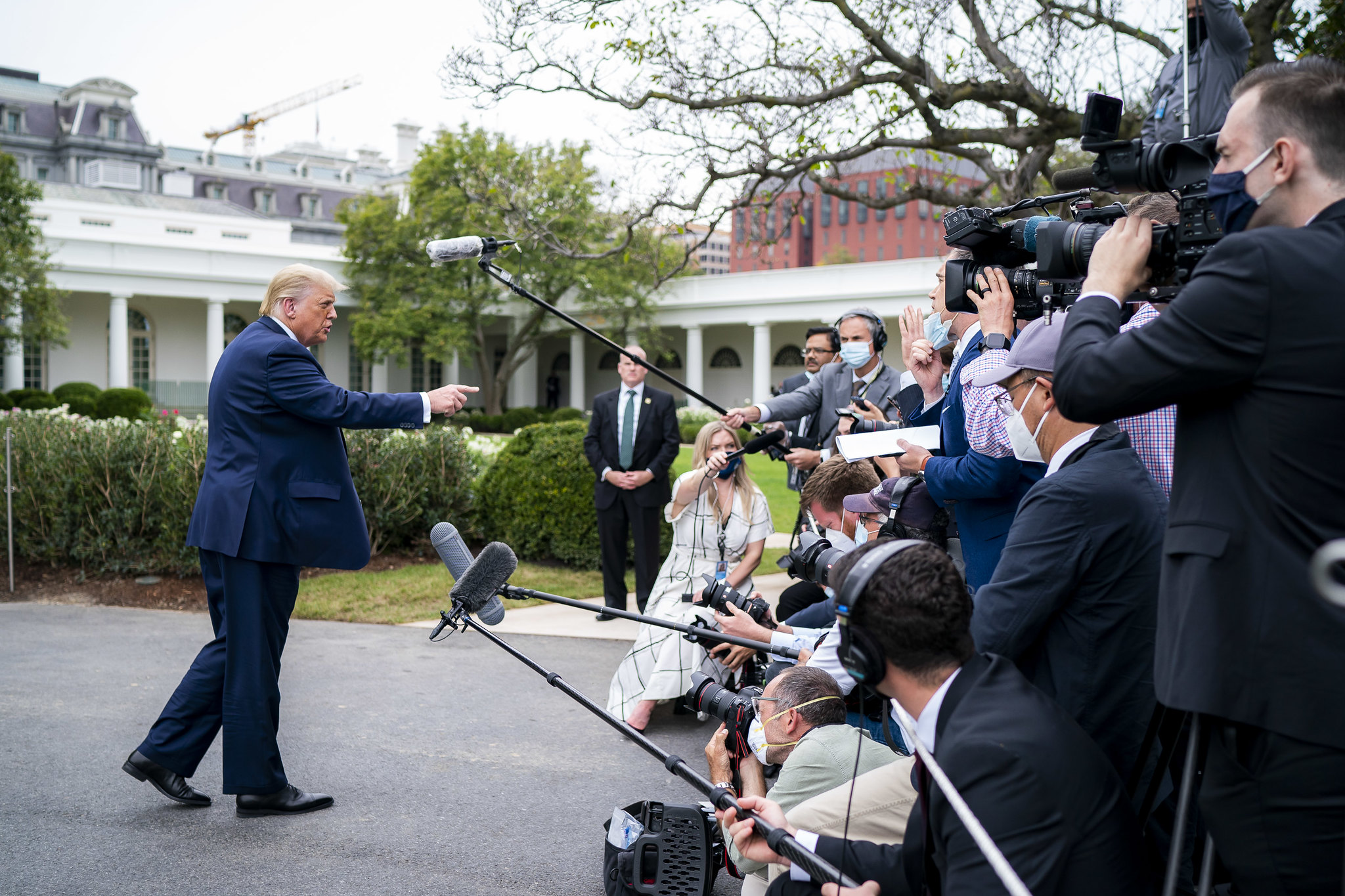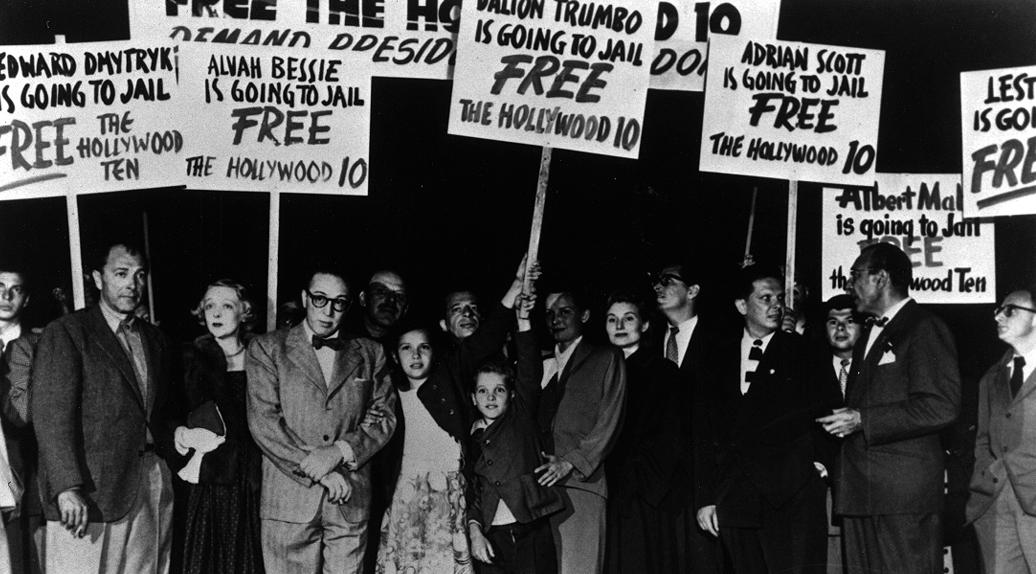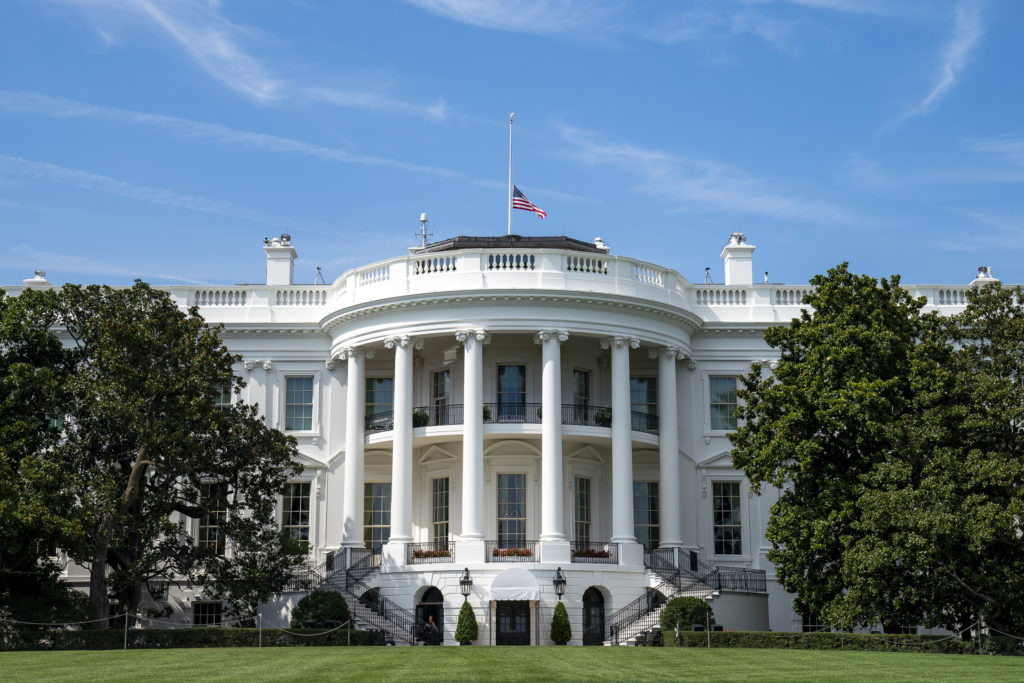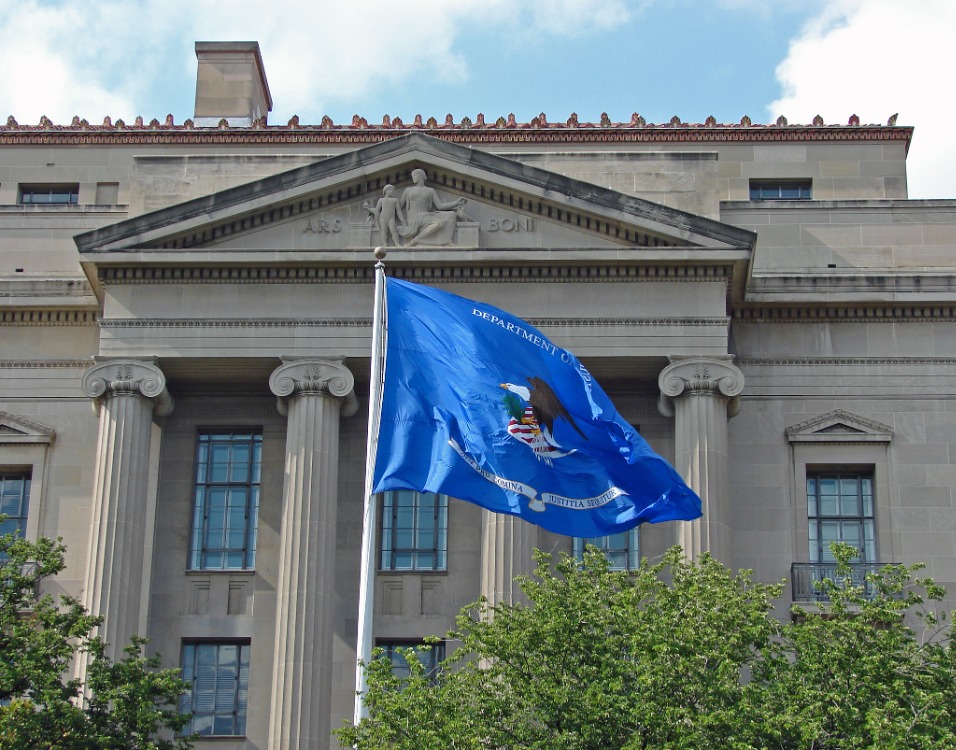Trump’s War on the U.S. Agency for Global Media
How the presidentially appointed CEO of the federal media agency hijacked his agency for the president’s political purposes.

Published by The Lawfare Institute
in Cooperation With

When the Biden administration takes office on Jan. 20, one place that will likely see quick and decisive change is the U.S. Agency for Global Media (USAGM)—a little-known agency that has seen a tumultuous few months.
The agency’s mandate is to promote unbiased news in support of freedom and democracy abroad. But this year, Michael Pack—the Trump-appointed CEO of the USAGM—attempted to purge the organization of career officials, censor criticisms of President Trump and withhold congressionally appropriated funding from a subsidiary of the media organization. Pack’s moves have continued to stoke fear over the White House’s mismanagement and attempted politicization of the federal agency intended to promote independent and credible journalism.
Or so say, anyway, a series of judicial rulings and administrative findings. Last week alone, Pack was confronted with three separate allegations of fraud and misuse of office. Prior to that, the U.S. Office of Special Counsel—an independent federal investigative body with no connection to former Special Counsel Robert Mueller—disclosed that it has found “a substantial likelihood of wrongdoing” under Pack’s leadership at the USAGM. And on Nov. 20, 2020, in the most recent ruling in a series of legal blows dealt to Pack, Chief Judge Beryl Howell of the U.S. District Court for the District of Columbia prohibited Pack and his USAGM board of executives from continuing activities that violate the First Amendment rights of journalists and editorial employees at Voice of America, which is overseen by the USAGM.
The USAGM is an independent federal agency composed of five news organizations: Voice of America, Radio Free Europe/Radio Liberty, Office of Cuba Broadcasting, Radio Free Asia and Middle East Broadcasting Networks. Its stated mission is to align U.S. national interests with global media, “to inform, engage and connect people around the world in support of freedom and democracy.”
The USAGM also supports the Open Technology Fund (OTF), an independent nonprofit organization that works to advance global internet freedom and protect citizens worldwide from repressive censorship and surveillance regimes. But under Pack’s leadership, the USAGM attempted to strip the organization of its leadership, seize control of its funding and lure away the OTF’s partners by redirecting them to a replacement fund.
These efforts too have faced judicial scrutiny. In October 2020, D.C. Superior Court Judge Shana Frost Matini rebuked Pack’s attacks against the OTF. In a case brought by the D.C. attorney general under nonprofit law, Matini ruled that Pack’s attempts to effectively overthrow the OTF’s leadership were unlawful and invalid—meaning that the OTF will be allowed to move forward with its original board without further dispute. Still, the nearly $20 million in congressionally appropriated funding Pack has withheld from the OTF remains undelivered.
Pack has plunged his agency into controversy since his Senate confirmation in June 2020. In addition to the multiple lawsuits that have been filed against him, there has been bipartisan condemnation of his tenure. Reporting now suggests that the Biden team is looking to undo what Pack did at the agency.
But Pack seems undeterred. On Dec. 7, 2020, CNBC reported that Pack was plotting a “final purge” of USAGM personnel before President-elect Joe Biden takes office. The following day, the Washington Post ran a story alleging that under Pack’s leadership the USAGM has refused to cooperate with Biden’s transition team. And on Dec. 9, the agency announced that Pack selected Robert Reilly, the former director 0f Voice of America, to return to lead the network. Reilly has been one of Pack’s few public supporters during his time as the USAGM CEO. Pack then appointed new conservative leaders of Radio Free Europe/Radio Liberty, the Office of Cuba Broadcasting, Radio Free Asia and the Middle East Broadcasting Network—decisions that drew sharp criticism from senior staffers at the organizations affected. He also proposed cutting all federal funding to the OTF in a Dec. 15 letter.
Amid bipartisan disapproval for these actions, two spending bills—both the National Defense Authorization Act (which Trump vetoed) and Congress’s coronavirus relief bill—included different provisions designed to limit the powers of the USAGM and its chief executive until a successor to Pack were to be appointed.
So how did all this unfold, and where does the litigation currently stand?
The USAGM’s troubles can be traced to spring 2020, when President Trump began pushing for Pack’s Senate confirmation. Pack, formerly a conservative filmmaker, was nominated to serve as the agency’s CEO more than two years earlier, but his nomination languished in large part because of a lack of enthusiasm on the part of Republican lawmakers. The president had made clear his intentions from the start: Upset about critical coverage of his administration from the USAGM’s subsidiaries, Trump stated that the Senate’s failure to confirm Pack was “preventing us from managing the Voice of America.” Trump’s claim earned a response from the news body, which subsequently ran an article titled “Trump’s VOA Criticism Shows US-Funded News Doesn’t Mean US-Approved.” But by March 2020, Pack’s confirmation was gaining momentum.
It was at this point—according to a Vice investigation—that Libby Liu, then the CEO of the OTF, and Laura Cunningham, then the president of the OTF, received what they described as a “quite threatening” call from two associates of Pack. Cunningham told Vice that Pack’s associates, Michael Horowitz and Karina Lantos Swett, had advised her and Liu “that if we wanted to make sure we stayed in CEO Pack’s good graces, that we needed to reorient our funds immediately” to support large-scale circumvention tools to help people in China bypass the Great Firewall.
(Editor's note: Through a representative, Swett disputes Vice’s account of this call and says she has no relationship to Pack. Vice stands by its reporting.)
The OTF has stayed away from such activity, because experts have cautioned that these “large-scale circumvention tools” present security concerns themselves, as they are closed-source technologies—meaning that researchers can’t vet them to understand their unique vulnerabilities. The OTF, accordingly, has gained the trust of technologists and activists globally by choosing to invest largely in open-source technologies.
Once Pack was confirmed in June, it became clear that Liu and Cunningham would not remain in his “good graces.” In his first week on the job, Pack fired multiple members of the USAGM’s bipartisan board to replace the officials with his own political appointees. On June 13, Liu expressed concern in an email about lobbying efforts to disrupt the OTF’s funding stream and resigned. Pack fired her anyway four days later. And the day after that, he fired Cunningham without offering a reason. He also dismissed the heads of the Middle East Broadcasting Networks, Radio Free Asia, Radio Free Europe/Radio Liberty and the Office of Cuba Broadcasting. Steve Bannon put it best: “We’re going hard on the charge,” the former Trump chief strategist told Vox. “Pack’s over there to clean house.”
The move attracted serious backlash from both sides of the political aisle. Republican and Democratic lawmakers alike condemned the staff cuts, and on July 21, a panel of the U.S. Court of Appeals for the D.C. Circuit issued an emergency injunction to block Pack’s staffing changes at the OTF. The court ruled per curiam that the OTF board replacements were invalid and warned that, absent an injunction, the “OTF faces an increasing risk that its decision-making will be taken over by the government, that it will suffer reputational harm, and that it will lose the ability to effectively operate.”
Nevertheless, Pack carried on.
On Aug. 12, Pack gutted the global media agency, removing a number of senior executives, including CFO and former interim CEO Grant Turner, general counsel David Kligerman, Chief Strategy Officer Shawn Powers, Deputy Director for Operations Matthew Walsh, Executive Director Oanh Tran and Director of Management Services Marie Lennon.
Meanwhile, the campaign against the OTF continued. Undeterred by the loss in court, Trump’s USAGM leadership demanded repeatedly that the OTF provide large amounts of highly detailed information under its obligations as a grantee. The USAGM requested, among other materials, personnel and pay records, every agreement the OTF had executed to date, and all of its communications with government officials—initially giving the organization 48 hours to comply. This all came as part of a “top-down review of USAGM’s serious security issues.” Cunningham, then the acting CEO and president of the OTF, expressed concern but complied by Aug. 17. On Aug. 18, the USAGM claimed its requests were not fully satisfied, stating that the “OTF has, therefore, failed to comply with a material term of the grant agreement,” and gave the organization “10 business days to bring itself into compliance.”
Two days later, Axios reported that the OTF was suing the USAGM for withholding $20 million in grants that were congressionally appropriated for the internet freedom nonprofit. According to Axios, sources feared that the USAGM was attempting to reroute the funds to its newly created Office of Internet Freedom—a move that would be illegal without approval from Congress, as noted both by Axios and, according to the lawsuit, by two of the USAGM’s own chief financial officers. For their part, both Democratic and Republican lawmakers objected to the USAGM’s actions under Pack’s leadership. In a statement, Republican Rep. Michael McCaul and Sen. Marsha Blackburn said they were “extremely concerned by the state of affairs at USAGM.”
On Sept. 24, the House Foreign Affairs Committee held a hearing on the USAGM, at which former executives who left the agency after Pack’s appointment testified. Pack was slated to testify but didn’t show.
Then came a whistleblower reprisal complaint filed to the State Department’s Office of Inspector General and the U.S. Office of Special Counsel. In the complaint, the six USAGM senior executives whom Pack had fired on Aug. 12—but who remained at the agency on “investigative leave”—alleged that they were retaliated against by Pack “because of his belief that they held political views opposed to his, which is a violation of the Hatch Act.” As detailed by Politico:
In perhaps the complaint’s most explosive allegation, its authors say one of them was told the media group’s CEO Michael Pack or one of his aides ordered a senior USAGM official to conduct research on the voting history of at least one employee at the media agency—a violation of laws protecting civil servants from undue political influence or reprisal.
The complaint also outlined concerns about Pack’s spending freeze, stating that the move “was especially harmful and significantly reduced the number of tools supported by the Open Technology Fund” and that “Pack’s failure to support the internet freedom tools created a specific physical danger to USAGM journalists.”
(The home page of the OTF’s website still states, “Due to the current lack of clarity around the availability and timeline of the remainder of our FY2020 funds, we have decided to postpone the opening of the upcoming rounds of the Internet Freedom Fund and the Core Infrastructure Fund.”)
Days after the complaint was filed, NPR broke news that two political appointees at the USAGM had compiled an “extensive report deemed ‘confidential’” on Voice of America journalist Steve Herman because they believed Herman had been unfairly biased against Trump and had broken the media outlet’s standards because of his “conflict of interest.” The two men presented a file from the investigation (including evidence such as Herman’s own tweets and “likes”) to Voice of America director Elez Biberaj, also a Trump appointee. NPR correspondent David Folkenflik reported that the secretive “investigation” seemed to be in violation of laws and regulations intended to protect Voice of America, which is federally funded, from political interference or influence.
On Oct. 8, the five suspended USAGM officials (Turner, Lennon, Powers, Walsh and Tran) filed a lawsuit against the USAGM and its leadership alleging the government’s “insidious politicization of journalism that threatens not only our nation’s publicly funded, independent media but also our nation’s reputation for modeling and defending a free press around the world.” The plaintiffs argued that defendants’ actions were unlawful and unconstitutional, citing the International Broadcasting Act, which holds that USAGM networks must operate under ethical and credible standards—one of which requires a “firewall between the newsroom and the publishers.” The suit claims that the USAGM, led by Pack, has tried to “accomplish exactly what the firewall prohibits: ‘attempt[ing] to direct, pressure, coerce, threaten, interfere with, or otherwise impermissibly influence any of the USAGM networks ... in the performance of their journalistic and broadcasting duties and activities’” (emphasis in original).
The 84-page document also states that USAGM officials “have retaliated against Plaintiffs as well as against Voice of America journalists who have engaged in protected expressive conduct, and have engaged in discrimination based on perceived viewpoint—all in clear contravention of the First Amendment,” causing “unquestionable irreparable harm.” It cites Pack’s staffing changes and asks the U.S. District Court for the District of Columbia to enforce the firewall deemed “critical” by federal law and ensure that the First Amendment rights of USAGM employees are defended.
The next week, Axios reported that the USAGM reached out to OTF grant recipients directly in an attempt to redirect their services to the Office of Internet Freedom. USAGM executives emailed the vendors and told them that they may already be eligible for the funding based on their existing relationship with the OTF. In response, the OTF added allegations to its existing lawsuit against the agency to address the solicitations. According to Axios, some analysts argued the recruiting was part of a USAGM maneuver designed to funnel money away from the OTF’s rigorous requirements and into projects favored by Pack’s leadership.
On Oct. 16, a superior court judge in Washington, D.C., ruled that actions taken by CEO Pack against the board of the OTF were invalid. This decision came in response to a July lawsuit filed by the office of the District of Columbia’s attorney general under the district’s Nonprofit Corporations Act. Judge Matini found that Pack did not have the authority to remove and replace OTF board members, given that the OTF is not a broadcaster and is not mentioned in 22 U.S.C. § 6209(d), which governs leadership of the USAGM’s grantee organizations. Therefore, the judge ruled, the original board of directors at the OTF remains in power and “any other actions by USAGM CEO Michael Pack and/or the replacement Board of Directors are invalid.” The issue of withheld OTF funding, which was not addressed in the D.C. attorney general’s suit, remains unresolved.
A month later, Chief Judge Howell of the U.S. District Court for the District of Columbia delivered a decision on the case brought forth by suspended USAGM officials. In a 76-page ruling in Turner v. U.S. Agency for Global Media, Howell granted in part and denied in part the plaintiffs’ motion for a preliminary injunction. On the basis of the International Broadcasting Act of 1994 (IBA), the Administrative Procedure Act (APA) and Pack’s fiduciary duties to the USAGM, Howell denied the motion, but she granted the motion on the basis of the First Amendment.
In her decision, Howell condemned Pack’s politicization of the USAGM, writing:
Together with his five co-defendants, who are individuals with no discernible journalism or broadcasting experience but nonetheless appointed by Pack to senior political leadership positions within USAGM, Pack has sought to interfere in the newsrooms of the USAGM networks, in violation of their eighty-year practice, enshrined in law, of journalistic autonomy, and has allegedly worked systematically to eliminate those USAGM employees and network journalists who both oppose his interference and produce journalistic content that, in Pack’s view, does not align with the political interests of President Trump.
With this condemnation, Howell found that, given the evidence presented, the plaintiffs were likely to succeed on the merits of their claims that defendants’ actions at the USAGM have violated the First Amendment. She then concluded that Voice of America journalists would suffer immediate and irreparable harm absent preliminary relief due to the defendants’ likely violation of their First Amendment rights. Further, Howell asserted that granting the preliminary injunction was in the public’s interest, writing, “That U.S. foreign policy with respect to U.S.-funded international broadcasting is centered on the promotion and exportation of First Amendment values only bolsters the inevitable conclusion that enforcement of [Voice of America] and network editors’ and journalists’ First Amendment rights is in the public interest.”
Howell’s decision barred Pack’s leadership from taking personnel actions against, or attempting to influence, individual journalists or editors at Voice of America. The ruling also prohibited Pack’s leadership from conducting “any and all investigations” into individual employees or alleged breaches of journalistic ethics at the USAGM’s subsidiary media organizations.
So the decision did stop Pack and his team from seeking out, punishing and controlling Voice of America employees who did not appear to support Trump. But it did not prevent Pack from continuing his campaign to politicize the USAGM through new leadership appointments. In fact, as noted previously, Pack has so far used what is likely to be his remaining month as USAGM CEO to announce a slew of fresh political appointments—naming new heads of Voice of America, Radio Free Europe/Radio Liberty, the Office of Cuba Broadcasting, Radio Free Asia and the Middle East Broadcasting Network.
In considering the events that have unfolded since Pack’s confirmation hearing in June 2020, it’s hard to see all of the CEO’s actions as anything other than an effort to turn the USAGM into a pro-Trump propoganda machine. Indeed, if Pack had gotten as he apparently desired—that is, censorship power over trusted independent global media outlets, such as the U.S.’s own Voice of America—it’s not hard to imagine the threat that such power would pose to democracy. This is especially striking given the president’s baseless claims of voter fraud and recent efforts to overturn the U.S. election—the very claims that incited a mob to storm the Capitol Building on Jan. 6 and led Facebook and Twitter to strip Trump’s power to post on those platforms due to concerns that he would provoke further violence.
As the U.S. commander in chief continues to peddle disinformation that effectively endangers the U.S. government, the USAGM’s mandate to protect the integrity of news and promote freedom and democracy worldwide seems more salient than ever. And despite Pack’s recent efforts to disrupt the transition process, the agency nonetheless appears posed to return to normalcy after a harrowing six months. Reporting suggests that the Biden team is already looking to reverse many of Pack’s actions, and the president-elect has previously committed to removing Pack from his post as the USAGM CEO.
Of course, a complete undoing of Pack’s term isn’t guaranteed. On Dec. 30, 2020, Folkenflik reported that Pack and his appointed board members of Radio Free Europe/Radio Liberty and Radio Free Asia have added binding contractual agreements designed to ensure that the two networks’ boards cannot be replaced for at least two years. Like many of Pack’s controversial maneuvers, this action garnered criticism from senior officials within the organizations that consequently froze the approval timelines of the contractual initiatives. As of now, neither contract has been authorized.
Still, Folkenflik notes that if the newly appointed presidents of the respective media outlets do eventually sign the contracts into effect, Pack “would maintain a significant degree of control over the networks,” even if he were to lose his seat as CEO. Such a prospect is reason for concern—as it would mean an enduring politicization and potential compromise of key international media outlets.
As stated by senior officials at Radio Free Europe/Radio Liberty, this could mean stripping their media organization of its journalistic independence, representing “precisely the kind of political power maneuver that [Radio Free Europe/Radio Liberty] regularly witnesses in places like Russia, Hungary, Belarus, and Tajikistan. We never thought we’d see it from our own oversight agency.”
Then again, such is the tale of the Trump administration. Over the past four years, Americans have witnessed an erosion of democratic norms that they never expected to see occur in the United States.





